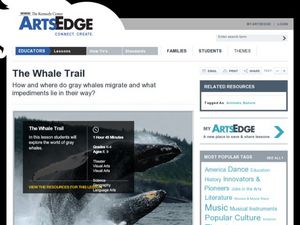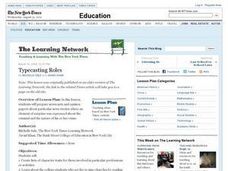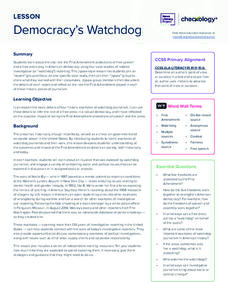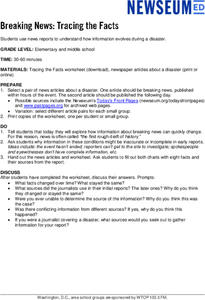Facing History and Ourselves
Social Media and Ferguson
How can social media help or hinder civil dialogue? How can information shared on social media be verified? As the investigation of media reports of the events surrounding the shooting of Michael Brown continues, class members read news...
Facing History and Ourselves
The Power of Images
One picture but a thousand stories. As a part of a case study of how the death of Michael Brown was reported by professional news sources and on social media class members examine the reactions of various groups to a photograph taken by...
Curated OER
Electronic Media
Pupils compare forms of electronic media. They watch a news broadcast and take notes on the content being conveyed. After viewing the broadcast, they read newspaper articles or news magazines to locate articles with similar content to...
Curated OER
Constitution Week
Students prepare one-minute broadcasts about events leading to the writing of the Constitution and current issues in the next election. Students read their broadcasts on the school P.A. system each morning during Constitution Week.
Curated OER
The Whale Trail
Students research the Gray Whale. In this Gray Whale lesson, students use KWL charts to organize information. Students do Internet research to gain information about the whales. Students get into groups and create a mock news broadcast...
Curated OER
Typecasting Roles
Students read and discuss various news articles where an element of surprise was present about the criminal and the crime. They research a news story, present the information in the form of a newscast, and write an opinion piece.
Curated OER
Our Savage Planet in the News
Young scholars research volcanoes, storms, atmospheric conditions and extreme environments. They collect information and create a simulation of a science newscast. They watch a video and write a letter as an eyewitness to an avalanche.
Curated OER
Current Events
Students research current events and simulate a newscast of a current news story. They watch the evening news and write a summary of a story of interest, conduct Internet research and complete a worksheet on a current event, and...
Curated OER
Cloud in the Classroom
Middle schoolers describe the relationship between animals and humans. For this biology lesson, students research about the history of horses in America. They present a mock news broadcast about their research.
Curated OER
Power and Impact of Radio as a Broadcast Medium
Students compare radio coverage of news events with coverage of 21st century new stories. They analyze various forms of media as they relate to news coverage. They write an essay comparing the impact of radio versus that of television
News Literacy Project
News Goggles: Conflicts of Interest in News Reports
Nineteen slides use the story of Chris Cuomo of CNN and his refusal to discuss his brother, New York governor Andrew's political troubles, to inform viewers about the idea of conflict of interest in journalism.
News Literacy Project
Democracy’s Watchdog
As part of a study of the importance of the First Amendment, expert groups research different historic case studies of investigative reporting, and then the experts share their findings with jigsaw groups. The case studies include Nellie...
Newseum
Bias Through History: Analyzing Historical Sources
Young journalists use the E.S.C.A.P.E. (evidence, source, context, audience, purpose, and execution) strategy to evaluate historical and contemporary examples of bias in the news. The class then uses the provided discussion questions to...
Newseum
The Press and the Presidency: Friend or Foe? How the President Is Portrayed
In theory, news reports should be fair and unbiased. Young journalists test this theory by selecting a current news story covered by various media outlets about the President of the United States. They then locate and analyze five...
Media Smarts
Bias
See how bias operates firsthand. Half of the class reads one article while the other half reads another article on the same event. The obvious differences emerge when the two sides talk about their observations though. Several handouts...
Media Smarts
The Citizen Reporter
Ripped from the headlines! Discuss topical social issues like racism, discrimination, and diversity while exploring the concept of citizen journalism. Begin with a professional-looking presentation on the history of citizen journalism....
PBS
What Makes A Good Video Report?
As part of a media literacy unit, class members establish criteria for good video reporting, and practice giving both positive (warm) and constructive (cool) criticism.
News Literacy Project
News Goggles: Lionel Ramos, Oklahoma Watch
Given all the recent criticism of the news media and coverage, it's crucial that young people are given the tools they need to evaluate what they see, hear, and read about current events. A video interview from "News Goggles" introduces...
Newseum
Civil Rights: Chronicling the Movement
Scholars investigate events in the civil rights era in their community and develop a multimedia presentation of their findings. They compare local events with national events discussed on a NewseumED timeline.
News Literacy Project
Fact-Check It!
Here's a lesson designed to help learners develop their digital verification skills. First, expert groups study specific digital verification skills, and in a jigsaw activity, share what they have learned with classmates. The jigsaw...
Newseum
Free Press Challenges Through History: Analyzing Historical Sources
The debate over the integrity of stories in media is not new. Young journalists analyze historical sources that reveal freedom of the press controversies and draw parallels to challenges freedom of the press faces today.
Newseum
Breaking News: Tracing the Facts
Breaking news reports can be short of facts. Young journalists select a pair of news articles about a disaster; one published within hours of the event and the second published the following day. They examine whether facts in the report...
Newseum
News About My Community
After researching statistics about their community in local census reports, young journalists interview a resident about their interests and then analyze a local newspaper or homepage to see how similar the stories are to the residents'...
Franklin D. Roosevelt Presidential Library & Museum
Pearl Harbor Activity #5: The Medium Matters
Young journalists learn that how we get our news and information matters in a collaborative social studies activity. The class is divided into three groups with the first analyzing a transcript of FDR's "Day of Infamy" speech, the second...
Other popular searches
- Public Broadcasting Service
- Television Broadcasting
- Broadcasting Activities
- Broadcasting Codes
- Radio Broadcasting
- Broadcasting Images
- History of News Broadcasting
- Weather Broadcasting
- Broadcasting News
- Broadcasting and Journalism
- Broadcasting (Journalism)
- Broadcasting Lessons






